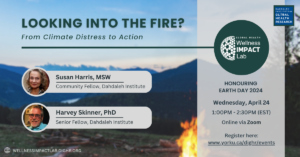Post
Published on May 29, 2024

On April 24, 2024, Dahdaleh senior fellow Dr. Harvey Skinner and community fellow Susan Harris dedicated a seminar in celebration of Earth Day. Susan initiated the gathering with a meditation session aimed at deepening participants’ connection to Earth, invoking a collective sentiment of gratitude for the planet’s life-sustaining resources. This meditative practice served not only as a spiritual grounding exercise, but also as a reflective pause, urging attendees to perceive the Earth with a dual lens of ancient wisdom and contemporary understanding.
Following the meditation, Harvey introduced the seminar’s focal theme—the integral relationship between self-healing and planetary healing. He articulated the escalating threats posed by climate change, one of which was environmental racism; A 2020 report by the UN Special Rapporteur on Toxic Wastes and Human Rights pointed to “A pattern in Canada where marginalized groups, and Indigenous peoples in particular, find themselves on the wrong side of a toxic divide, subject to conditions that would not be acceptable elsewhere in Canada.” Susan and Harvey further emphasized the narrowing window for effective intervention and structured the seminar to explore three strategic approaches: updating attendees on current climate research, discussing individual and collective healing actions, and demonstrating resilience-building practices.
The seminar facilitated an interactive dialogue among participants, termed a “chat waterfall,” where individuals expressed diverse emotional responses to climate change, ranging from fear and hopelessness to a resolve for action. This exchange not only fostered a communal understanding but also highlighted the psychological impact of ecological crises, highlighting the importance of mental health considerations in climate discussions. The Lancet Planetary Health reported that in a 2022 national survey, 78% of Young Canadians (aged 16-25) said climate change impacts their overall mental health, but even though the youth are suffering, only one-third of them reach out for help because of past experiences where they were dismissed.
Additionally, the Re.Climate Center at Carleton University performed a comprehensive review of over 91 publicly available surveys to assess Canadian climate priorities, noting that climate consciousness dropped from 40% in December 2019, coinciding with the rise of housing prices. This decline is likely due to economic concerns, despite the fact that sustainability could lower prices and improve quality of life. Furthermore, there are political variations based on region; the highest level of concern for the climate is in Quebec (84%) and the lowest is in Alberta (55%). There is a need to bridge the gap between people with different political inclinations so we may all reach a common consensus on how to take climate-protective measures.
In their closing remarks, Susan and Harvey stressed the urgency of immediate and collective action to mitigate environmental degradation. A 2023 international online survey of nearly 60,000 adults (18+) across 23 countries (70% of the world’s population) showed that the most consistent way to impassion people across the globe is to persuade them that “later is too late” for the children of our future. The presenters also underscored the need to engage people and get them talking about their feelings and concerns through mechanisms such as Climate Cafés.
The event concluded on a note of empowerment, urging participants to transform their newfound awareness into proactive endeavors for sustainable practices, environmental advocacy, and personal responsibility towards the planet. Overall, the seminar was a blend of introspection, education, and mobilization, effectively connecting the introspective depth of meditation with the pragmatic urgency of environmental activism. It served as an urgent call for heightened consciousness and action in the face of global ecological challenges.
Watch the seminar presentation below:
Connect with Dr. Harvey Skinner and Susan Harris
Themes | Global Health & Humanitarianism, Planetary Health |
Status | Active |
Related Work | |
Updates |
N/A
|
People |
Harvey Skinner, Senior Fellow, Faculty of Health - Active
Susan Harris, Community Scholar, Meditation, Wellness, and Selfcare - Active |
You may also be interested in…
Recap – FALLING SKY STUDIO: Mystery Painting Workshop
Mystery Painting is a form of imaginative induction by which we turn a problem into symbol. It provides a means of connecting inner and outer worlds: the world of our daily life with the world …Read more about this Post
Check out the SWOT at the UNC Water and Health Conference
The Safe Water Optimization Tool (SWOT) team will be at the upcoming UNC Chapel Hill Water and Health Conference, October 24 to 28, at the University of North Carolina Chapel Hill. James Brown, our field technical …Read more about this Post
Recap — Springing into Action: Steps to Developing an Effective Action Plan
By this time of year, most people have abandoned any New Year’s resolutions they established back in January. On March 15, Prof. Harvey Skinner led the final instalment of the Wellness and Self-Care mini-series at …Read more about this Post



